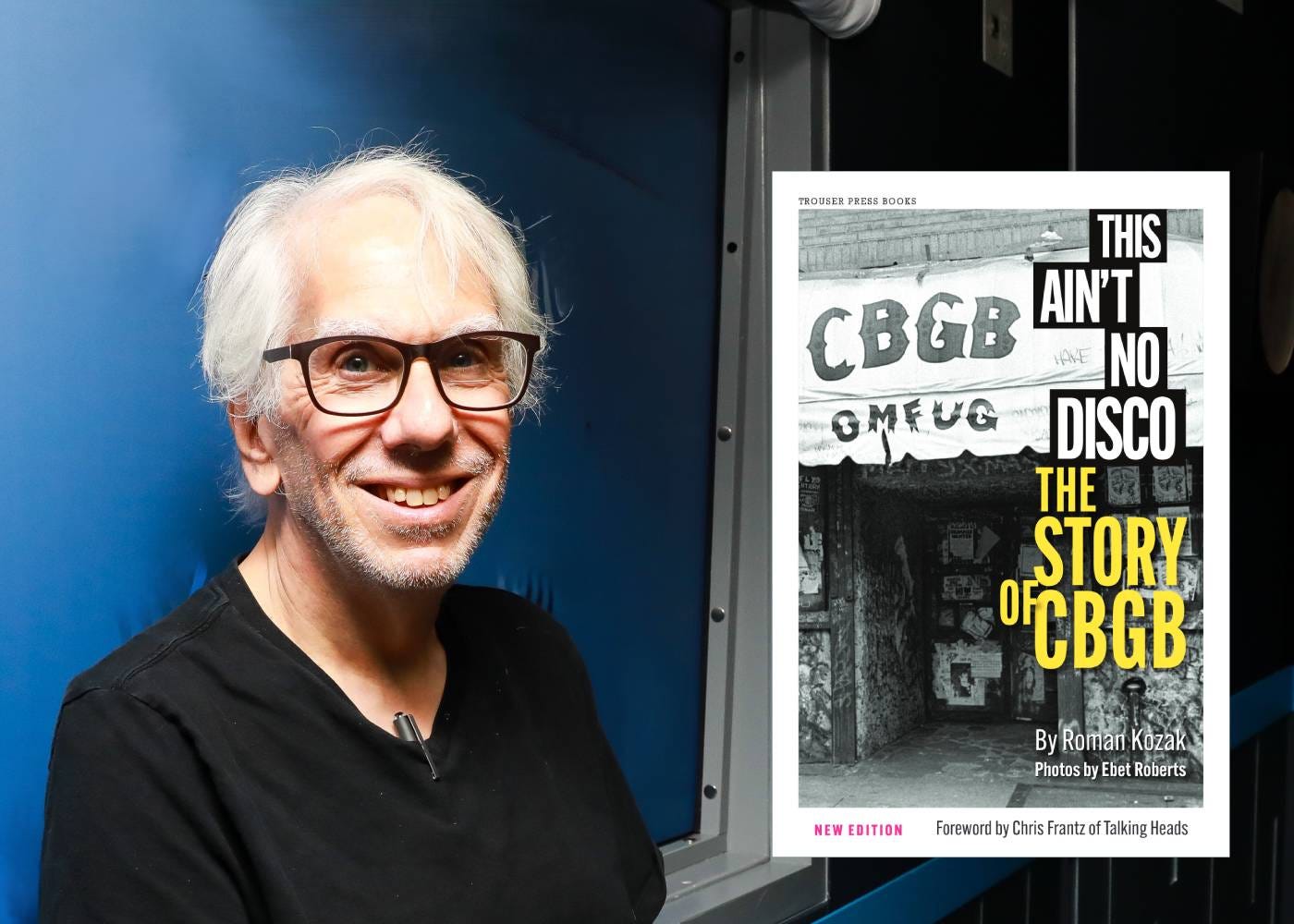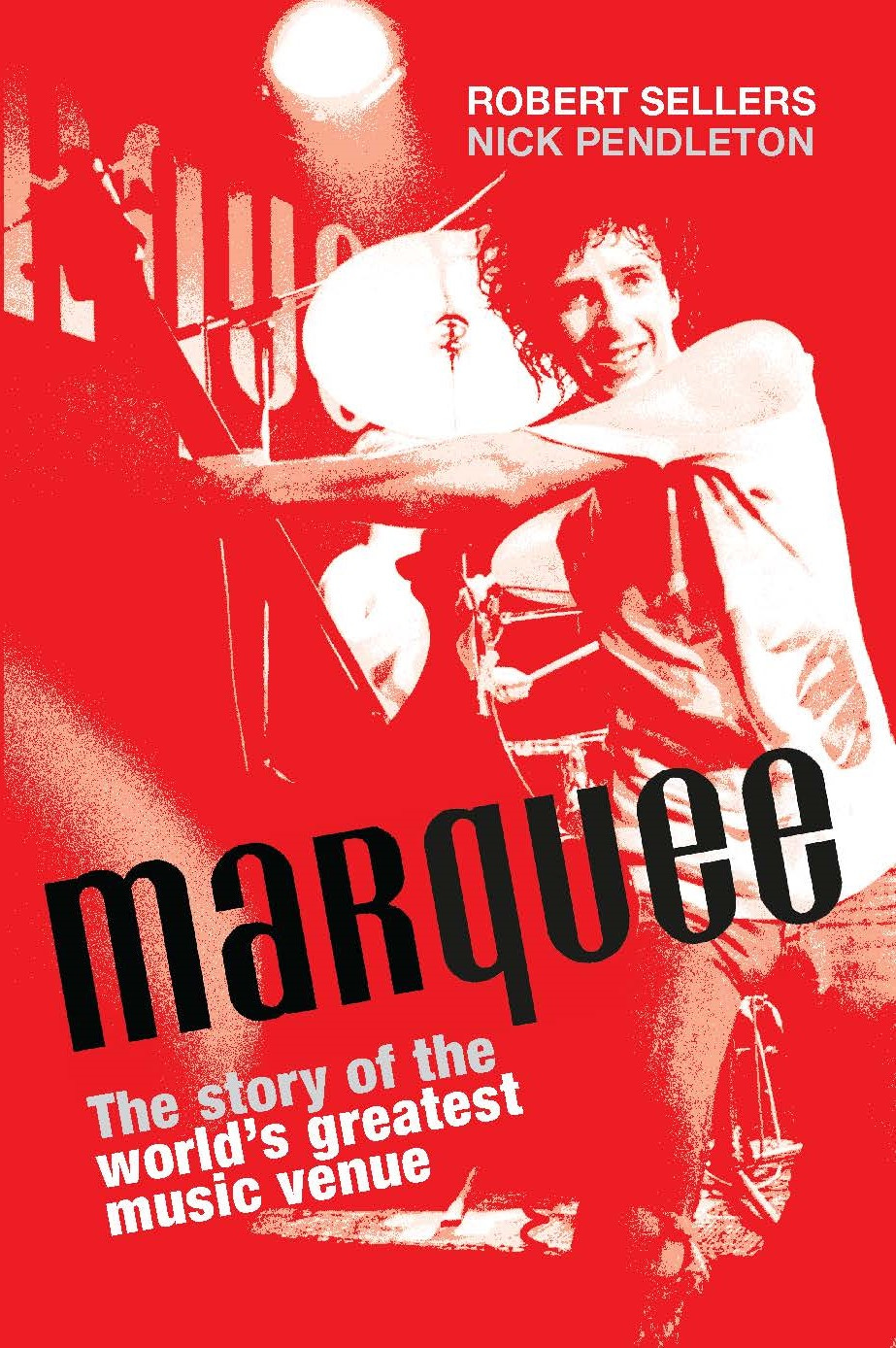So much has been written about legendary New York punk club CBGB that it’s hard to know what to focus on.
Thankfully, we have trusted curators like Ira Robbins pointing us to the good stuff. A founder of long gone print music zine Trouser Press, Robbins saw many shows at CBGB during the club’s ‘70s and ‘80s hey day…and performed there himself in the ‘90s.
This month, Trouser Press Books will republish Roman Kozak’s 1988 biography This Ain’t No Disco: The Story Of CBGB. It’s a definitive look at founder Hilly Kristal and the club’s unvarnished history as told in the late ‘80s when CBGB was a little past its prime, but still operating with the same ethos that made it world famous.
The book includes quotes from Joey Ramone and Dee Dee Ramone (Ramones), Chris Stein (Blondie), David Byrne (Talking Heads), Annie Golden (Shirts), Richard Hell (Television), Lenny Kaye (Patti Smith Group), and Wendy O. Williams (Plasmatics), among many others. These firsthand perspectives collectively offer a unique view of the venue’s day-to-day realities, the highs and lows often missed by the T-shirt logo mythology that has built up since CBGB closed down in 2006.
“(Kozak is) not who you would expect to be the chronicler of CBGB, but a very nice guy. I knew him to say hello back in the day because he was an editor at Billboard in New York and we moved in some of the same circles,” Robbins told me for the interview below.
“I didn't know him as a CBGB regular, but I read the book when it came out and realized he had done the work and gotten the story down. I was recently reminded that I attended the original book's release party at CBGB.”
I got a sneak peek at the Trouser Press Books edition—including a new foreword by Chris Frantz of Talking Heads, photographs by Ebet Roberts, and two early 2000s CBGB articles by Robbins—and it’s a truly fascinating read.
I caught up with Robbins by email to discuss This Ain’t No Disco, how the project came together, his personal memories of CBGBs, and what’s next for Trouser Press Books.
… This ain't no party, this ain't no disco
This ain't no fooling around
No time for dancing, or lovey-dovey
I ain't got time for that now
Ira Robbins Interview
This Ain't No Disco is a great read. Like time traveling to an era I never experienced. How did Trouser Press Books come to republish this book?
When I started Trouser Press Books in earnest in 2022, I decided one of my goals was to republish out-of-print music books that I admired. I have a pretty substantial library of music books, so I picked a few and reached out to a couple of authors to float the idea. The first one led me to the widow of an author whose book was quite a desirable rarity, but that effort ran aground for a totally bizarre reason (don't ask) and so I dropped it.
I knew that Roman Kozak, author of This Ain't No Disco, had died in the '80s, so I did some research to see who his heirs might be, It took a while and some networking, but I was finally able to locate and contact his sister. She was okay with the idea, so I helped her get a release from the book's original 1988 publisher and then made a deal with her to allow Trouser Press Books to republish it.
Reading This Ain't No Disco now, how do you think this book holds up against the CBGB legend that has grown in the decades since?
The book tells the club's story without any of the larger-than-life mythos that it's been reduced to (or, I suppose, expanded to) in the years since. CBGB was not a glamorous place, it was an unprepossessing venue where we saw great bands and hung out with friends. But that's not what younger generations who know the bands but never went to the club imagine. The book documents the history and the people involved at a time when it was a going concern, still doing what it always had done. Kozak talked to everyone and grounds the story in reality.
CBGB went through some changes in its time, but it never became unrecognizable to us. It never got fancied up or commercialized or smoothed out—it was a Bowery dive with a great sound system that presented and nurtured a ton of great music—as all first-rank music venues do. That made it legendary, but people who only know the name and the A-list bands associated with CB's early days will be amazed and amused —edified, even—at learning what actually went on, the successes and the failures, the glory and the gunk.
I've read a lot about Hilly Kristal over the years, but this book really gives a complete picture of the man behind the myth. Do you think the music universe could ever produce another iconoclastic character like him?
Not a chance, Hilly was a one-off all the way. I didn't know any of his story when I was seeing bands at CBGB in the '70s—I didn't know his name was Hillel, that he'd been a recording artist, that he'd been involved in so many aspects of the culture. To me and my friends back then he was just the imposing guy who ran the place. We didn't approach him and he didn't hassle us. I'm glad he gets his due here.
You are quoted throughout the book. At one point you say that you were originally "violently taken aback" by the Ramones because they were "breaking all the rules in a way that was not at all amusing." What changed your assessment of the four brudders from Queens?
I kind of wish I hadn't told Roman that when he interviewed me. I said much the same thing to Jim Bessman when he interviewed me for his Ramones biography a few years later. But it's true. I didn't get the Ramones when I first started seeing them; perhaps I was still mentally rooted in the rock I had grown up on—accomplished and ambitious artists like The Who, Clapton, Stones, etc.—and was put off by the Ramones' stripped-down minimalism.
I was particularly bugged that Johnny didn't play the minor chord in "California Sun." The cartoony aspect of the band—Dee Dee's count-ins, Joey's gangly posture and impenetrable slurring of lyrics ("i donwannago downthebase...."), the songs' ridiculous subject matter—led me to undervalue the pure joyous power of the music. It wasn't until Janis Schacht, who was Sire Records' publicist when the label was housed in a brownstone in the West 70s, played me an advance of the first album in her office at wall-shaking volume that I fell in love with the band. I think the pure pop charm of "I Wanna Be Your Boyfriend" helped push me into their camp.
Looking back on New York in the '70s and '80s, who are a few of your other favorite bands to come out of CBGB? Any specific CBGB shows that stand out in your memory?
It's hard to recall specific thoughts about shows that I witnessed nearly 50 years ago by bands that went on to play other, larger venues. A lot of the bands played various places around town—I saw Television, Patti Smith and The Heartbreakers at Max's, Blondie at Mother's and the Palladium and the Ramones at the Bottom Line in addition to CB's. I wish I had a list of all the bands I saw at CB's.
The Planets were always great—I saw them at CBGB many times. All the early bands had something to offer—The Marbles, Miamis, Mumps, Mink DeVille...but it does kind of blur together in my memory.
The out of town bands who did important gigs at CBGB left a clearer impression on me—The Damned, The Jam, X-Ray Spex, Runaways.
At one memorable Dead Boys show, Stiv Bators got knocked in the head by a floor tom heaved by the band's drummer and was left on the stage as the rest of them left. Also, my band, Utensil, played CBGB a couple of times in the '90s, so those nights were pretty special for me.
The book includes your brief article for New York Newsday about the closing night of CBGB in 2006. In it you quote Patti Smith saying; "CBGB is a state of mind." In your estimation, is that still true 20+ years later?
Absolutely. The combination of encouraging expression and creative freedom that Hilly fostered was the club's through-line, and that was punk in the purest sense. Whatever the music sounded like, it was all punk. And CBGB will forever be the epicenter of New York punk.
What's next for Trouser Press Books?
Along with This Ain't No Disco, we're bringing out the North American edition of Marquee, a British book about the history of London's Marquee club.
That's it for our 2024 schedule, but we've got a bunch of cool stuff coming in early 2025, including a fascinating new book by my dear friend Pete Silverton, who completed it before he died last year, and a really entertaining rock and roll novel.
Ramones: Read To Ruin
They were four leather-clad misfits with bowl cuts playing an irreverent brand of revved-up bubblegum music.







Am planning to pick this up, and went straight to YouTube to listen to Patti's show again. Thanks!
I look forward to reading the book, kudos to Ira Robbins for his work to keep this stuff available! I subscribed & loved Trouser Press back in the day, and have always had immense respect for Ira (and Dave Schulps, who wrote extensively for the mag).
It gave me comfort to read this:
"I didn't get the Ramones when I first started seeing them; perhaps I was still mentally rooted in the rock I had grown up on—accomplished and ambitious artists like The Who, Clapton, Stones, etc.—and was put off by the Ramones' stripped-down minimalism."
That was exactly my reaction to the Ramones - I saw them 2 or 3 times in the late '70s and just *didn't get it* - but now many decades later, I totally do get it. Rock 'n' roll will never die.